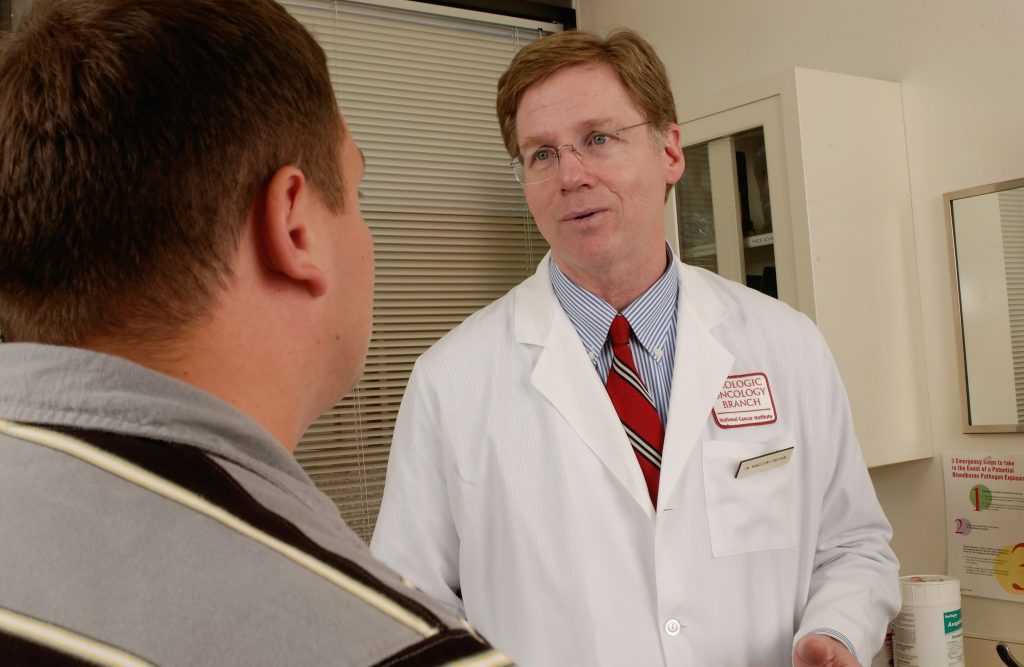The urologist is responsible for diagnosing and treating conditions of the male and female urinary and reproductive systems, including infections, cancer, erectile dysfunction, and prostate issues. Learn everything about this specialty in today’s article.
Urology is a medical specialty focused on diagnosing, treating, and managing diseases related to the male and female urinary and reproductive systems.
This includes conditions ranging from urinary tract infections and kidney stones to, in men, prostate cancer and erectile dysfunction.
Urologists, therefore, play an essential role in male urinary and sexual health.
In addition to diagnosing and treating diseases of the urinary and reproductive systems, urologists also offer preventive counseling and help educate patients about healthy habits, disease prevention, and available treatment options.
The specialization covers everything from routine consultations to advanced surgical procedures, ensuring patients receive comprehensive and personalized care for their specific needs.
Although urologists are highly accessible, a pioneering study conducted by the Brazilian Society of Urology (SBU) in 2023 found that 46% of men over 40 seek medical assistance only when they experience specific symptoms.
Unfortunately, many men do not have the habit of undergoing regular check-ups, which can lead to long-term health issues.
Want to understand better what a urologist does? Follow our guide today.
What does a urologist do?

The urologist specializes in diagnosing and treating diseases related to the urinary tract not only in men (as many think) but also in women. Moreover, they also treat the male reproductive system.
In men specifically, this includes organs such as:
- prostate,
- testicles,
- penis,
- associated glands,
- ureters,
- urethra,
- bladder
- and even the kidneys.
Urologists deal with a variety of conditions, from urinary tract infections and kidney stones to prostate cancer and erectile dysfunction.
Moreover, urologists also perform surgeries to correct issues in these areas of the body. Many do not know, but the urologist is also responsible for kidney transplants.
Read also: Men’s health: how to stay healthy all year round?
Diseases treated by the urologist

As we have seen, the urologist is responsible for treating numerous diseases in men, ranging from simple conditions (such as urinary tract infections) to complex surgeries (such as kidney transplant or for the treatment of Peyronie’s Disease, for example).
Below, we will provide a brief description of the main diseases that can be treated by the urologist.
Urinary tract infections
Very common in both men and women, urinary tract infections are caused by bacteria and can affect any part of the urinary system, including the kidneys, ureters, bladder, and urethra. The main symptoms are pain when urinating, frequent need to urinate, and abdominal pain.
Urinary incontinence
Urinary incontinence is the involuntary loss of urine, which can occur due to weakness of the pelvic floor muscles, nerve damage, or other medical conditions.
See also: What are Kegel exercises for men? Discover benefits and how to do them at home
Overactive bladder
An overactive bladder is a disorder of the urinary system characterized by involuntary and frequent contractions of the bladder, resulting in sudden and intense urgency to urinate, often accompanied by urinary incontinence.
Hypotonic bladder
On the other hand, the so-called hypotonic or hypoactive bladder does not contract properly, leading to difficulty in completely emptying during urination, resulting in symptoms such as post-micturition dribbling, increased residual urine volume, and recurrent urinary tract infections.
Kidney stones
Kidney stones are as common as urinary tract infections. However, if not properly treated and diagnosed early, they can become more serious issues.
The so-called kidney stones are solid formations that develop for various reasons and can cause intense pain when they move through the urinary tract.
Prostate cancer
Prostate cancer is one of the most common among men, occurring in the prostate gland. It may require different forms of treatment, such as surgery, radiotherapy, or hormonal therapy.
Erectile dysfunction
Erectile dysfunction is characterized by persistent difficulty in achieving or maintaining an erection sufficient for satisfactory sexual activity, which can be caused by physical or psychological factors.
Learn more at: Self-care for erectile dysfunction: 6 solutions for a healthy life
Male infertility
Male infertility is another of the sexual problems treated by the urologist. The inability to fertilize occurs due to issues such as low sperm count, poor sperm quality, or blockages in the reproductive ducts.
Chronic kidney disease
Chronic kidney disease is a condition in which the kidneys gradually lose their function over time. This can lead to a range of serious complications.
Treatment may include measures to control the progression of the disease, such as diet and medications, as well as therapies, such as dialysis.
Kidney transplant, one of the most effective treatments, is performed by a urologist specialized in complex urological surgeries.
Kidney tumor
A kidney tumor, like in any other part of the body, is an abnormal mass of cells that develops, which can be benign (non-cancerous) or malignant (kidney cancer).
The most common renal cancer is renal cell carcinoma. The treatment of a kidney tumor depends on the stage of the cancer and other individual factors of the patient.
The urologist is the specialist responsible for treating these tumors, working in conjunction with a multidisciplinary team to provide the best personalized treatment plan for each patient.
Peyronie’s disease
Peyronie’s disease is a condition in which the penis develops a curvature, often in an “L” shape, due to trauma or microtraumas during sex.
This curvature can cause deformities and, in severe cases, even pain during erection. Initially, treatment aims to stabilize the condition, using medications to control inflammation and improve blood circulation in the penis.
If medications are ineffective and the disease progresses to the scarring phase, surgery is usually recommended to correct the curvature and treat any associated complications, such as erectile dysfunction.
The Egydio Technique developed by urologist Dr. Paulo Egydio, is a geometric surgical method to correct penile curvature in Peyronie’s or congenital disease.
It involves incisions in the fibrous tissue to lengthen the penis, maintaining length and diameter, and preserving erectile function. Globally recognized, it has evolved into a procedure that dispenses with grafts, being considered effective and safe.
Learn more at: What is the Egydio technique?
When to see a specialist?
Seek the help of a urologist if you are experiencing any of the following symptoms or clinical signs related to the urinary or reproductive system:
- Pain when urinating
- Difficulty urinating
- Urinary incontinence
- Frequent or urgent urination
- Blood in the urine
- Pain in the testicles, groin, or lower abdomen
- Changes in the size, shape, or sensitivity of the testicles
- Problems with erection or ejaculation
- Decreased sexual desire
- Abnormal discharge from the penis
- Swelling or lumps in the genitals
- Infertility or difficulty conceiving
- Symptoms of sexually transmitted infections (STIs), such as urethral discharge, genital sores, or itching.
What does the urologist do at the first consultation?
The first consultation with a urologist will be an opportunity to discuss any health concerns related to the urinary or reproductive system.
If necessary, the doctor can also develop a personalized care plan to meet the specific needs of the patient.
The evaluation is typically based on the following criteria:
- Medical History;
- Physical Exam;
- Additional Tests;
- Possible Diagnosis and Treatment Plan, if any.
Also read: Male Check-up: Tests Every Man Needs
How to Prepare for a Consultation with a Urologist?
To properly prepare for a consultation with a urologist, follow some basic rules:
- Organize your medical information, bringing relevant medical records, including results from previous tests, reports from past urological surgeries or treatments, and a list of medications you are currently taking;
- Make a list of symptoms, which can help the doctor with the diagnosis;
- Prepare questions so you don’t forget anything during the consultation;
- Dress appropriately, wearing comfortable and easily accessible clothing, in case a physical evaluation is needed.
Main Urological Tests Requested
Some of the main urological tests requested by a urologist are:
- Urine test;
- Specific blood tests (such as testosterone or PSA);
- Digital rectal exam;
- Ultrasound of the urinary tract;
- CT and MRI of the urinary tract;
- Cystoscopy;
- Excretory urography;
- Uroflowmetry;
- Urodynamics.
Also read: How is the prostate exam done? We answer the most common questions
From What Age Should Men Visit a Urologist?
There isn’t a specific age when men must visit a urologist, but it is recommended that men start considering regular visits to a urologist from the age of 40, especially if they have risk factors such as a family history of prostate cancer or other urological issues.
After the age of 50, men should periodically visit a urologist to perform the digital rectal exam.
Furthermore, younger men should consult a urologist if they have symptoms or concerns related to the health of the urinary or reproductive tract, such as difficulty urinating, testicular pain, changes in sexual function, blood in the urine, or infertility.
In summary, the age to visit a urologist can vary depending on individual health needs and specific patient concerns.
Also read: Is a Changed PSA Cancer? See What the Change Means and What to Do
How to Choose the Best Urologist?
Choosing the best urologist involves considering factors to ensure your health is in good hands.
Pay attention to the doctor’s experience and credentials. Also, evaluate their reputation and recommendations:
Consider seeking information about the specialist and understanding if the doctor has specific experience in treatment.
By considering these aspects, you will be better prepared to choose a doctor who meets your needs and provides the best possible care.
Dr. Paulo Egydio is a Urologist Specialized in Penile Problems
Dr. Paulo Egydio is dedicated to the treatment of penile curvature and the implementation of prostheses. He is the author of several scientific articles and books on the subject.
Known as the creator of the “Egydio Technique,” his method involves making multiple geometrically calculated incisions in the penile tunica to expand the tissues and perform penile reconstruction.
If you are facing problems with erectile dysfunction or penile curvature, do not hesitate and seek help. EMC clinic is always ready to assist you. Contact us now and schedule an appointment!

